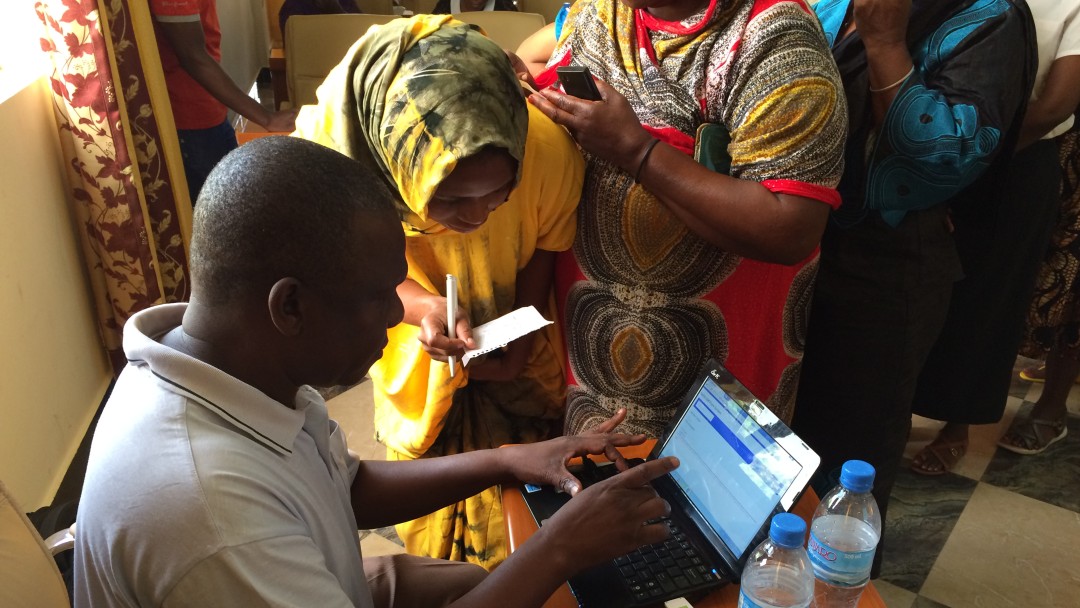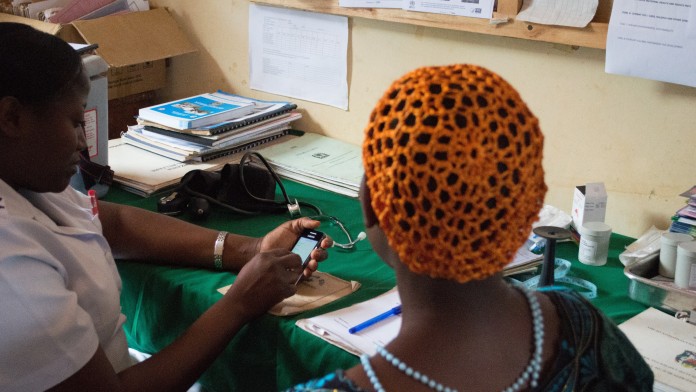News from 2019-04-05 / KfW Development Bank
KfW providing digital insurance solutions to help Tanzania deliver universal health care

The World Health Organization (WHO) has dedicated this year's World Health Day, which falls on 7 April, to the theme of universal health coverage. This reaffirms the importance of the goal of comprehensive health care worldwide, giving substance to the human right to health proclaimed by the United Nations.
In reality, people in developing countries and emerging economies are often unable to afford a doctor should they fall ill – if medical assistance is available at all. After all, one billion people do not have any access or equal access to appropriate and affordable health care. Each year, up to 100 million people fall below the poverty line because they have to pay for the costs of medical treatment out of their own pocket. In addition, the health systems are often weak, lacking adequate infrastructure, specialists, medicines, sustainable financing and efficient management.
The goal of universal health coverage therefore involves every human being having access to health-related information, basic health services, and effective, high-quality and affordable medications and vaccines. And each and every person must have the opportunity to protect themselves from financial risks in the event of illness without falling into financial difficulties. Alongside health care for individuals, another key aspect is general public health to benefit the population at large. The issue is prioritised accordingly in the 2030 Agenda, where it is third among the Sustainable Development Goals.
If everyone is to be reached, the financial burdens resulting from illness or health care must be covered through an insurance policy. This is also a priority practice area for KfW Development Bank as it seeks to strengthen health services in its partner countries and, in turn, improve living conditions. One example of this is Tanzania, where KfW has invested more than EUR 30 million on behalf of the Federal Ministry for Economic Cooperation and Development (BMZ) to guarantee care for impoverished pregnant women and their babies. The package of services – which is now open to disadvantaged sections of the population – is provided by the national insurance agency, which previously only covered officials and privately insured individuals. More than a million women in five regions have used these services to receive suitable medical assistance, giving them added peace of mind as they approach childbirth and the postnatal period. In addition, the more than a thousand health facilities have also benefited from the reimbursements, seeing improvements to their equipment, range of services and performance capacity.

Last but not least, the enrolment opportunities for indigent pregnant women represent a kind of beta version of Tanzania’s declared health policy goal: to introduce nationwide compulsory health insurance for the entire population. The national health insurance system currently caters to fewer than 4 million members, so there is a great deal of work to be done to cover the country’s 56 million inhabitants. And KfW is also lending a helping hand in this area, teaming up with Tanzanian partners and acting on behalf of the German Federal Government to prepare an additional project that seeks to expand health insurance through innovative and digital solutions. The aim is to exploit the huge potential of these solutions and enable health insurance providers to cover the entire population by using an expanded IT infrastructure, improved processes, and modern systems and technologies. This should not only be true in terms of numbers and in all parts of the country, but also individually, thanks to new, tailor-made approaches; for instance, for people who are particularly poor and in need – individuals who would otherwise be unreachable.
This will be possible as a result of insurers achieving significant cost efficiencies from using digital technologies, such as the ability for customers to register from their mobile phone and receive text messages reminding them of medical appointments. In addition, the billing processes between insurers and health facilities will be digitalised, facilitating swift reimbursement for services. KfW is aiming to provide EUR 8 million from Federal Government funds to implement the measures. These measures will involve designing specific digital solutions together with the executing agency’s IT personnel and the future users – and, naturally, gauging their reception among users through test runs. By all indications, they should be given the all-clear – registration from mobile devices, SMS notifications and electronic billing for services have already been introduced and proven successful for a substantial amount of time with the insurance program for pregnant women. This is a good sign for all the other innovations from this project, too. These will now be rolled out at the next level up and undergo further development within comprehensive e-health processes. Until the goal of universal health care for the Tanzanian population is achieved and true substance is given to their right to health in the long run.

Share page
To share the content of this page with your network, click on one of the icons below.
Note on data protection: When you share content, your personal data is transferred to the selected network.
Data protection
Alternatively, you can also copy the short link: https://www.kfw-entwicklungsbank.de/s/enzBWrMC.B95A
Copy link Link copied